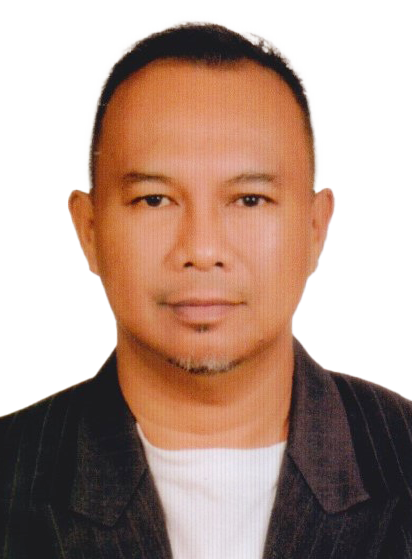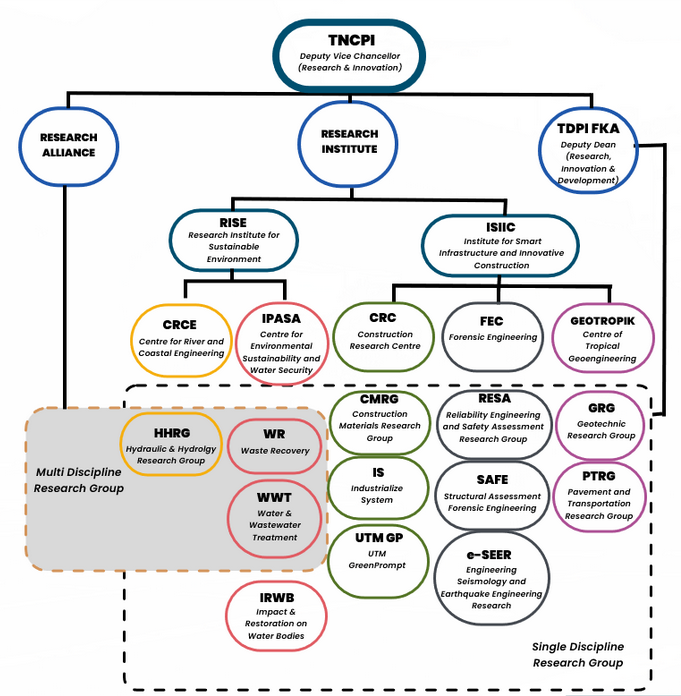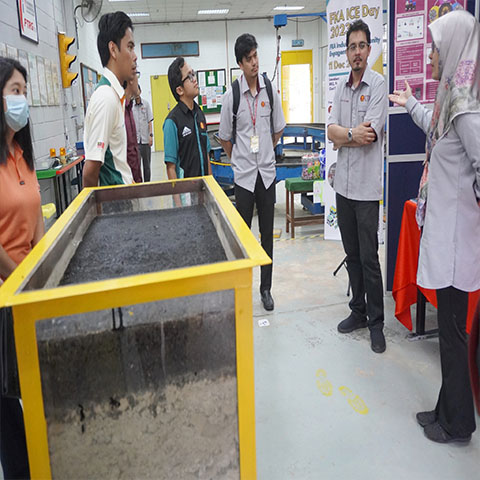Welcome to
RESEARCH
Faculty of civil engineering
research
At the Research Unit of the Faculty of Civil Engineering, we are committed to advancing the field of civil engineering through cutting-edge research, innovation, and collaboration. Our dedicated team of researchers, faculty members, and students work together to address complex challenges and contribute to the development of sustainable and resilient infrastructure solutions. Here, you’ll find information about our ongoing research projects, areas of expertise, and the impact of our work on society.

Prof. Ir. Ts. Dr. Ahmad Safuan A Rashid
Deputy Dean
(Research, Innovation & Development)

Ts. Dr. Mohd Idham Mohd Satar
Research Manager

Dr. Aidee Kamal Khamis
Research and Knowledge Manager

Mdm. Azura Abu Bakar
Office Secretary
RESEARCH ENTITY
MYRA
GRANT REPOSITORY
PUBLICATION
IP & COMMERCIALIZATION
NICHE AREA
Transportation
Our Transportation Niche Area is dedicated to revolutionizing the way we move and connect within our cities and beyond. As the global demand for efficient, eco-friendly, and technologically advanced transportation systems intensifies, our researchers and experts are at the forefront of designing solutions that address today’s challenges while preparing for the challenges of tomorrow.
Water Security
Water Security Niche Area stands at the forefront of safeguarding water resources for a rapidly changing world. In the face of growing populations, urbanization, and environmental shifts, we delve into solutions that bridge science, engineering, policy, and social engagement to create a sustainable water future.
Geoengineering & Natural Hazard
Geoengineering and Water Hazard Niche Area stands as a bastion against natural water hazards. From landslides to flooding, we explore the intricate interplay between geological processes and water, seeking to develop strategies that reduce risks and protect lives and property
Detail Augmentation in Civil Engineering
Our Detail Augmentation in Civil Engineering Niche Area is devoted to elevating the design and execution of civil engineering projects through the mastery of intricate details. From enhancing structural integrity to optimizing materials and methodologies, we push the boundaries of excellence in every facet of our work..
Smart & Resilient Infrastructure
Our Smart & Resilient Infrastructure Niche Area is a testament to our commitment to crafting infrastructure that meets the demands of the 21st century. From smart cities to intelligent transportation systems, we harness technology to enhance efficiency, sustainability, and resilience across a spectrum of civil engineering projects.
Faculty of Civil Engineering, UTM
RESEARCH ENTITY
Faculty Civil Engineering have:
-
- 5 Research Center
- 12 Research Group

RESEARCH CENTRE
- Forensic Engineering (FEC)
- Construction Research Centre (CRC)
- Centre of Tropical Geoengineering (GEOTROPIK)
- Centre for Environmental Sustainability and Water Security (IPASA)
- Centre for River and Coastal Engineering (CRCE)
RESEARCH GROUP
- Construction Materials Research Group (CMRG)
- Engineering Seismology and Earthquake Engineering Research (eSEER)
- Industrialize System (IS)
- Reliability Engineering and Safety Assessment (RESA)
- Structural Assessment Forensic Engineering (SAFE)
- UTM GREENPrompt (UTMGP)
- Geotechnic Research Group (GRG)
- Pavement & Transportation Research Group (PTRG)
- Waste Recovery (WR)Water & Wastewater Treatment (WWT)
- Impact & Restoration on Water Bodies (IRWB)
- Hydraulics & Hydrology Research Group (HHRG)
- Integrated Water Resource Management (IWRM)
MyRA
Malaysian Research Assessment
MyRA B – QUANTITY AND QUALITY OF RESEARCHERS
MyRA C – QUANTITY AND QUALITY OF RESEARCH
MyRA E – INNOVATION
MyRA F – PROFESSIONAL SERVICES AND GIFTS
MyRA G – NETWORKING AND LINKAGES
MyRA H – SUPPORT FACILITIES
Malaysian Research Assessment
GRANT REPOSITORY
The grants facilitate innovative solutions, embodying the faculty’s ethos of boundary-pushing and real-world change, providing resources for researchers and students.
-
-
-
-
-
-
-
- Interactions of Microplastics in Urban Rivers with Heavy Metals
- Development of Low-Cost Filtaration System for Wastewater Reuse
- Life Cycle Assessment (LCA) Froma Gete-to Gate: Impact of Palm Oil Mill Waste Incorporation Into Fired Clay Brick
- Study on Sustainability Best Practices Program at Higher Education Institutions (HEIs)
- Thermal Behavior of Eco-Aerated Concrete from Agro-Industrial Waste as Innovative Cool Building Wall Components
- Stiffness formulation of ISO container structure for residential building
- Displacement analysis formulations for deployable scissor mechanism structure
- Structural Vulnerability and Risk Analysis of Offshore Structure
- Improving Power Conversion Efficiency And The Eco-Friendliness Of Perovskite Solar Cell Using Zn-Modified Hydroxyapatite
- UHPC confinement for repairing damaged concrete
- Bond Behaviour of Steel Rebar in Steel Fibre Reinforced Lightweight Aggregate
- Projection of Weather Extremes in Peninsular Malaysia for Shared Socioeconomic Scenarios
- Effects of coated aggregate properties using treated crumb rubber and plastic on the mechanical performance of asphalt mixtures
- Hydrodynamics of floating tidal turbines operating under wave conditions
- Mitigation Evaluation of Microplastic Contamination by Sustainable Landfill Liner
- Algorithm Modelling of Crack Damage and Severity Detection using Deep Learning Technique
- Investigation of Compressibility Properties of Soft Soil Treated by Cementitious Material in Slurry and Dry Mixing Method
- Relationship between asphaltene and bitumen-aggregate adhesion property of bituminous mixture
-
-
-
-
-
-
————————-
PUBLICATION
The Faculty of Civil Engineering’s diverse research covers breakthroughs in structural engineering and sustainable construction practices, spanning a wide range of disciplines.
-
-
-
-
-
-
-
- Journal & Joint Publication
- Case Study
- MyCite
- Research Book
- Policy Paper
- Book Chapter
- Proceedings
- Other Publication
-
-
-
-
-
-
————————-
IP & COMMERCIALISATION
1. Patent Granted
-
-
-
-
- Method of Integrated Multi-Trophic Aquaculture
- Fuse Damper and Buckling-Restrained Brace System for Protecting Building Structure Against Lateral Loads
- System and Method to Repair a Pre-Damaged Concrete Column
- A Concrete Drainage
- Composition of Interlocking Hollow Block or Brick
-
-
-
2. Other IPR
-
-
-
-
- Asphalt Food Waste Binder (Green Road Technology)
- Holistic Initiatives for Decision Making in Retrofitting of Zero Energy Building in Higher Learning Institutions
- Course Content on Analysis and Design Under Seismic and Wind Loads
- Integrated Disaster Risk Index (IDRI) Framework for Local Assessment
- Innovation of Asphalt FWB: Turning Waste into Resources
- A Method of Producing Lightweight Interlocking Brick Using Palm Oil Biomass Wastes
-
-
-
————————-
CONSULTANCY
1. Patent Granted
- Method of Integrated Multi-Trophic Aquaculture
- Fuse Damper and Buckling-Restrained Brace System for Protecting Building Structure Against Lateral Loads
- System and Method to Repair a Pre-Damaged Concrete Column
- A Concrete Drainage
- Composition of Interlocking Hollow Block or Brick
2. Other IPR
- Asphalt Food Waste Binder (Green Road Technology)
- Holistic Initiatives for Decision Making in Retrofitting of Zero Energy Building in Higher Learning Institutions
- Course Content on Analysis and Design Under Seismic and Wind Loads
- Integrated Disaster Risk Index (IDRI) Framework for Local Assessment
- Innovation of Asphalt FWB: Turning Waste into Resources
- A Method of Producing Lightweight Interlocking Brick Using Palm Oil Biomass Wastes

